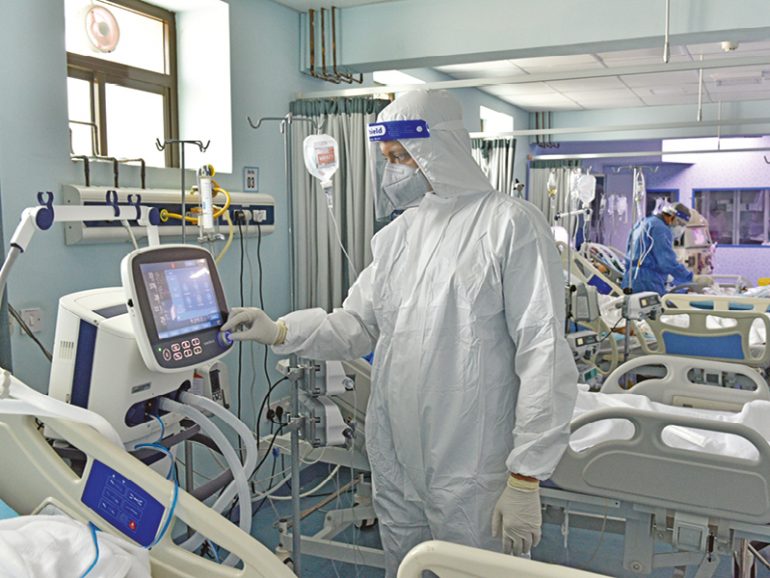

The private health sector in Oman responds proactively to shoulder its responsibility in fighting the pandemic
Private hospitals in Oman have grown from strength to strength and adapted to the fight against the COVID-19 pandemic alongside the public health sector. To reduce the burden of the pandemic on public hospitals, the Ministry of Health inaugurated the first Field Hospital on the premises of what was the earlier Muscat Airport in Seeb in October 2020.
However, before the Field Hospital was set up, in May 2020 AdLife Hospital in Amerat offered its entire new facility to Omani Medical Association to establish a COVID-19 hospital. Following its inauguration, H E Dr Ahmed bin Mohammed al Sa’eedi, Minister of Health, said, “We have excellent proof in Oman that the private sector has been a very effective partner in the fight against the pandemic.” The hospital was run between May 2020 and August 2020.
In an example of community support, Aster al Raffah Hospital, under its CSR programme Aster Volunteers Mobile Medical Services in collaboration with the Ministry of Health, set up a free mobile health camp and screened more than 3,000 patients. The initiative won an award from International Hospital Federation in a category called ‘Beyond the call of duty for COVID-19 response recognition programme’.
The onslaught of the pandemic necessitated private healthcare institutions in Oman to adapt, and adapt fast. Speaking to Muscat Daily during the spike in cases prior to the Eid al Adha lockdown, Jacob Oommen, chief operating officer, Badr al Samaa Group of Hospitals, said, “We are continuously increasing bed capacity for COVID-19 patients in our hospital. Being the largest private healthcare group in Oman, our share of responsibilities is proportionately big.”
In the beginning, the hospital dedicated 25 normal beds, 16 ICU beds and eight ventilators for COVID-19 patients. “The number has grown to 113 normal beds, 29 ICU beds and 19 ventilators. In the private sector, Badr al Sam-aa’s contribution of beds in the Muscat region is 37 per cent and in the rest of Oman, it is 90 per cent. Since the onset of COVID-19, we have expanded our capacity 3.5 times to 142 COVID-19 beds or 35 per cent of the total available in the private healthcare sector,” said Oommen.
AdLife, a new entrant in Oman’s private healthcare sector, dealt with the pandemic even before starting full fledged operations. “We decided to open our 24-bed facility exclusively for COVID-19,” Viji Varghese, CEO of AdLife Hospital, informed.
“For us, it was an advantage because inpatient facilities were not operational for other medical streams. We could mobilise all our existing skilled manpower in managing the COVID-19 dedicated ward.”
AdLife’s ICU facility is awaiting approval following which its three intensive care beds will be dedicated to COVID-19 patients. “We used to find ICU beds for critical patients in another hospital within six hours to a day. Sometimes, it took longer depending on demand of ICU beds in the city,” Varghese said.
The hospital employs its in-house anaesthetist and facilities to take care of serious patients in an ICU setup. “We are able to provide intensive care, including non-invasive ventilation, till we find an ICU bed in another hospital,” Varghese said.
Aster al Raffah Hospital has dedicated a special floor to COVID-19 patients. It has a separate entry and exit and is run by specially trained staff. “We started this facility with six beds and later added four more. In all, we now have ten normal beds, including four high-flow nasal oxygen (HFNO) units, and two dedicated ICU beds. This floor has the maximum number of negative pressure rooms with dedicated split ACs, which makes it safe from any kind of cross-infection,” said Dr Dilip Abdul Khadar, head of Quality & Patient Safety at Aster al Raffah Hospital.
“HFNO is very important in managing COVID-19 patients with low oxygen saturation. No other hospital has these in Oman,” he claimed.
From shortage of medicines to critical healthcare staff, private hospitals have dealt with exigencies of the pandemic judiciously. “One of the first steps we took at the start of the pandemic was have a pharmacy committee meeting. We decided to have a good stock of life-saving medicines required to manage COVID-19 patients. Due to advance planning, we did not face any shortage despite supply disruptions,” Dr Abdul Khadar said.
As Badr al Samaa increased its COVID-19 bed capacity, manning these required skilled and experienced staff. “Though we are aggressively identifying skilled resources locally, due to a temporary suspension in visa processing and travel restrictions, we are unable to recruit new doctors,” said Sameer P T, CEO, Badr al Samaa Group of Hospitals.
Besides skilled manpower, the hospital is also facing a scarcity in life-saving drugs. “Due to increased demand, the shortage sometimes affects at a critical stage of treatment. The available substitute drugs are not so effective and special imports will increase the cost of treatment,” Sameer added.
AdLife too faced a shortage of medicines used mainly for COVID-19 supportive therapy. “However, we quickly adapted to the supply chain dynamics of medicines and were able to manage the shortage,” Varghese said.
(Text and photo by Syed Fasiuddin)
© 2021 Apex Press and Publishing. All Rights Reserved. Powered by Mesdac